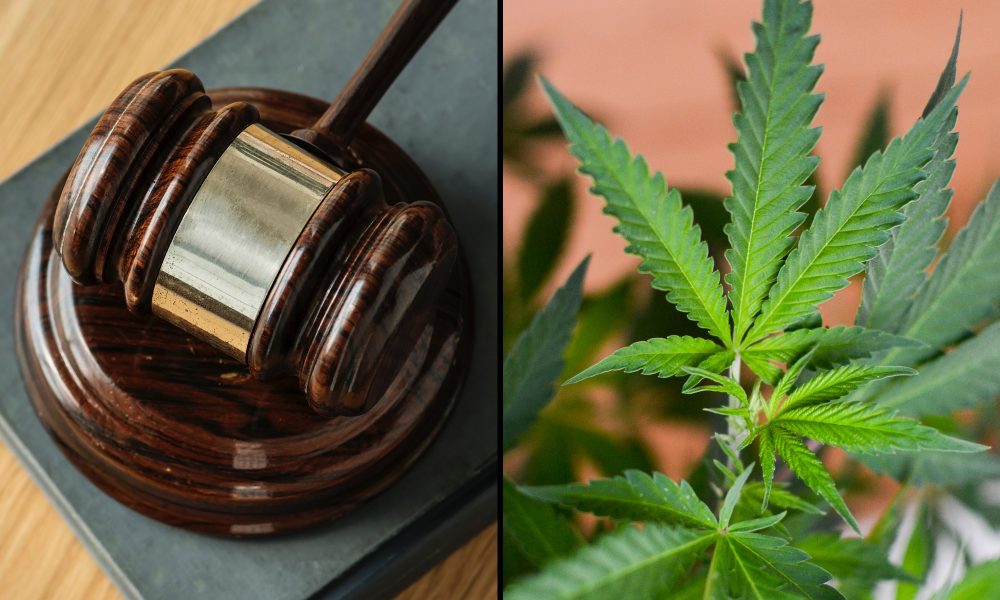The Oklahoma Supreme Court is delaying its decision on whether a marijuana legalization initiative that was certified by the state last week will appear on the November ballot, drawing mixed reactions from activists and lawmakers.
Oklahomans for Sensible Marijuana Laws (OSML) submitted more than enough signatures to qualify their measure last month, and they also accepted ballot title language revisions from the state attorney general before the secretary of state’s office certified the signatures last week.
The problem is, there are more procedural steps that the campaign must clear, including a 10-day period in which anyone can challenge the initiative’s text, before formal ballot placement can be assured. State officials have argued that the campaign risked missing ballot printing cutoff dates, however, despite the signature certification. Activists have filed a lawsuit arguing that the deadlines suggested by state officials are “arbitrary,” and are asking the Supreme Court to force the state to put the measure before voters in November.
A major contention in the case is the fact that the secretary of state’s ballot verification process was outsourced to a third party for the first time this year, and activists argued the company slow-walked the signature certification, potentially jeopardizing their ability to meet the printing deadline.
In a June letter, Oklahoma Election Board Secretary Paul Ziriax further asserted that the governor would have needed to issue an executive proclamation to officially certify any ballot initiative by last Friday. But advocates have pushed back on that interpretation.
On Monday, the court, in a 5-4 decision, said it was assuming jurisdiction of the case and that the dispute would be “held in abeyance because the time period for filing objections to either the signatures or the ballot title has not yet expired.” That means that the justices are not ready to decide on the central question and will wait until the normal ballot placement process works itself out before weighing in.
For now, that’s welcome news for OSML, though it also raises questions about how state officials will react when it comes to preparing ballots in the meantime.
At this stage, the court could have simply issued a declaration that the campaign failed to have their petition processed in time, keeping it off the ballot. But rather than take that action, it’s temporarily letting the measure proceed through the normal challenge process despite state officials arguing that key deadlines have already passed.
After the Oklahoma Supreme Court Ruling, Advocates are optimistic State Question 820 will appear on the November 2022 ballot#PressRelease #SQ820 #LegalizeIt #Oklahoma pic.twitter.com/kiL96GiaA1
— Yes on 820 Campaign (@YesOn820) August 30, 2022
In one of a pair of dissenting opinions that were filed, Justice Dustin Rowe said that he would have denied the petitioner’s request for emergency relief outright, complaining that the court’s order “does not provide clear directions to Respondents as to how to proceed while the matter is held in abeyance.”
“Delaying this matter, which could culminate in changes to ballots which have already begun to be produced, undermines the Election Board’s capacity to fulfill its lawful obligation to voters and threatens the voting rights of portions of the electorate—particularly our men and women serving in uniform overseas,” the justice argued, referring to the fact that ballots much be printed early in order to have time to mail them to military personnel across the world.
Nonetheless, because the court ultimately held the case in abeyance for now, the ballot title will be posted in a newspaper as early as Wednesday, kicking off a 10-day period where anyone can challenge the measure, an attorney representing the campaign told Marijuana Moment on Monday.
After that point, the court would need to resolve any challenges. If nobody contests the initiative—or the court resolves challenges that are submitted—it’s possible that the justices could force the state to print the measure on the ballot in spite of the now-passed deadlines.
Alternatively, however, it could decide after that 10-day challenge period that it sides with the state and the measure would not go before voters this November and could be delayed until the next state election.
Still, OSML is encouraged by the latest development.
“We are thrilled the court has officially recognized State Question 820 has more than enough valid signatures to be considered for the November 2022 ballot,” OSML Campaign Director Michelle Tilley said in a press release. “It appears the court is giving itself the opportunity to order SQ 820 on the ballot if we survive the protest period.”
Senior Campaign Advisor Ryan Kiesel said that advocates are “grateful for the Justices’ thoughtfulness and expediency adjudicating this urgent matter, in accordance with Article V, Section 3 of the Oklahoma Constitution.”
“We will follow the remaining process laid out in the law, as we always have,” Kiesel said.
A representative from the secretary of state’s office referred Marijuana Moment to the Board of Elections for comment or clarification on the new court order. A spokesperson for the elections board did not directly respond to the court’s latest filing, but told Marijuana Moment that last week’s report on statutory and practical ballot deadlines “is common practice.”
Meanwhile, several state lawmakers who are supportive of putting the question of legalization before voters took a less optimistic position on the court’s latest filing, with Rep. Forrest Bennett (D) accusing the governor of using “his power to stall the process” for the ballot reform.
I think @GovStitt is scared of this SQ and has used his powers to stall the process for it.
I think the people did everything right, so there’s no legitimate reason it shouldn’t be there.
I think if you would’ve voted YES to 820, you should vote NO on a 2nd term for @govstitt. https://t.co/nPyDGfy0ws
— Forrest Bennett (@ForrestBennett) August 30, 2022
If you’re tired of politicians using the system they control for purely political, self-serving interests (and to YOUR detriment) you need to understand that the power to change things is all yours.
Vote for a Democrat in November.
— Forrest Bennett (@ForrestBennett) August 30, 2022
“Disappointed that new delays and barriers have made our citizen-led state question process harder,” Sen. Julia Kirt (D) said. “The people should have a straightforward, consistent way to petition to put changes in the ballot.”
Disappointed that new delays and barriers have made our citizen-led state question process harder. The people should have a straightforward, consistent way to petition to put changes in the ballot. #oklahoma #ouroklahoma https://t.co/cw0HSN8nkv
— Julia Kirt (@JuliaKirt) August 30, 2022
Here’s what the initiative would achieve if placed on the ballot and passed:
The measure would allow adults 21 and older to purchase and possess up to one ounce of cannabis, grow up to six mature plants and six seedings for personal use. The current Oklahoma Medical Marijuana Authority would be responsible for regulating the program and issuing cannabis business licenses.
A 15 percent excise tax would be imposed on adult-use marijuana products, with revenue going to an “Oklahoma Marijuana Revenue Trust Fund.”
The funds would first cover the cost of administrating the program and the rest would be divided between municipalities where the sales occurred (10 percent), the State Judicial Revolving Fund (10 percent), the general fund (30 percent), public education grants (30 percent) and grants for programs involved in substance misuse treatment and prevention (20 percent).
People serving in prison for activity made legal under the measure could “file a petition for resentencing, reversal of conviction and dismissal of case, or modification of judgment and sentence.” Those who’ve already served their sentence for such a conviction could also petition the courts for expungement.
OSML, which is being backed by the national New Approach PAC, is one of two citizen efforts to put legalization on the ballot that launched this year.
The other campaign, Oklahomans for Responsible Cannabis Action (ORCA), tried to challenge the constitutionality of OSML’s competing measure on a single-subject basis, but the Supreme Court rejected the argument in April.
Gov. Kevin Stitt (R) claimed in his State of the State speech earlier this year that voters were mislead when they passed an earlier 2018 initiative to legalize medical marijuana in the state, arguing that the measure may require legislative reform.
The governor said that the ballot question passed by voters “was misleading, and it has tied our hands as we regulate the industry.”
For his part, state Rep. Scott Fetgatter (R) said in an op-ed for Marijuana Moment that was published in March that states should legalize cannabis, but he wants to see the legislature craft thoughtful regulations for an adult-use program, rather than leave it to voters at the ballot.
Meanwhile, an Oklahoma Senate committee in April unanimously approved a House-passed bill to allow for the cultivation and administration of psilocybin by eligible institutions for research purposes—but the version that senators advanced omits a broader decriminalization provision that had previously been included. The legislation was ultimately not enacted before the end of the session.
Here’s the state of play for other 2022 drug policy ballot initiatives:
In North Dakota, voters will have the chance to decide on marijuana legalization at the ballot this November, the secretary of state’s office confirmed.
Legalization will also appear on the ballot in neighboring South Dakota.
The Arkansas Supreme Court recently ordered the secretary of state’s office to certify a marijuana legalization initiative for the November ballot—but there’s a chance that the votes will not end up being counted, depending on the final outcome of a pending legal challenge.
Maryland elections officials have finalized the language for a marijuana legalization referendum that lawmakers placed on the November ballot, and have issued a formal summary of the reform proposal.
Missouri’s secretary of state announced earlier this month that activists had turned in enough signatures to put marijuana legalization on the state’s November ballot.
Nebraska lawmakers and advocates are considering new paths forward for marijuana reform—including pursuing recreational legalization on the 2024 ballot or convening a special legislative session to pass medical cannabis in the interim—after state officials announced that a medically focused reform campaign had come up short on signatures to put their measures before voters this year. Officials have since said that they will be conducting another review of the signatures for the Nebraska measures.
Michigan activists announced in June that they will no longer be pursuing a statewide psychedelics legalization ballot initiative for this year’s election and will instead focus on qualifying the measure to go before voters in 2024.
The campaign behind an effort to decriminalize drugs and expand treatment and recovery services in Washington State said in June that it has halted its push to qualify an initiative for November’s ballot.
While Wyoming activists said earlier this year that they made solid progress in collecting signatures for a pair of ballot initiatives to decriminalize marijuana possession and legalize medical cannabis, they didn’t get enough to make the 2022 ballot deadline and will be aiming for 2024 while simultaneously pushing the legislature to advance reform even sooner.
In March, California activists announced that they came up short on collecting enough signatures to qualify a measure to legalize psilocybin mushrooms for the state’s November ballot, though they aren’t giving up on a future election cycle bid.
An effort to put adult-use legalization on the statewide ballot in Ohio fizzled out this year, but the campaign did secure a procedural legal win that will allow them to hit the ground running for a planned 2023 reform initiative.
Locally, Ohio voters in at least seven cities will get a chance to join many of their neighboring jurisdictions in enacting local marijuana decriminalization at the ballot this November.
Voters in five Texas cities will also vote on local cannabis decriminalization measures this year.
Advocates have also worked to place local decriminalization ordinances on the ballot in West Virginia.
Wisconsin voters in at least half a dozen cities and counties will also be asked on November’s ballot whether they support legalizing, taxing and regulating cannabis in a manner similar to alcohol. Those Wisconsin advisory questions will be non-binding, however, and are intended to take the temperature of voters and send a message to lawmakers about where their constituents stand.
Photo elements courtesy of rawpixel and Philip Steffan.
Medical Disclaimer:
The information provided in these blog posts is intended for general informational and educational purposes only. It is not a substitute for professional medical advice, diagnosis, or treatment. Always seek the advice of your physician or other qualified healthcare provider with any questions you may have regarding a medical condition. The use of any information provided in these blog posts is solely at your own risk. The authors and the website do not recommend or endorse any specific products, treatments, or procedures mentioned. Reliance on any information in these blog posts is solely at your own discretion.







